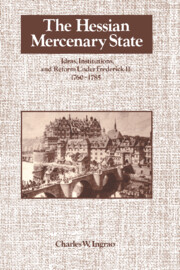Book contents
Summary
For most of the last century the stress on the authoritarian nature of enlightened absolutism has led us to underemphasize the degree to which government functioned by consensus. Rather we have tended to credit the prince with taking the initiative and shaping the course of enlightened government. Over the last two decades historians have come to appreciate the bureaucracy's role as an agent for progressive change. Thus, while the character and philosophical stance of the prince was clearly the single most important factor in determining government policy, most scholars would agree today that it was the bureaucracy that provided the greatest common denominator in developing a uniform view toward the role of governments throughout the German states. Of late historians have also come to realize that the German regimes cooperated with the corporate bodies and the nobility that controlled them – whether out of choice or necessity – and have stressed their willingness to preserve and work with existing social and political institutions. At no point, however, have historians indicated that these corporate bodies actively participated in the making of policy or themselves helped develop the kinds of reform programs that we have come to associate with the legacy of Enlightenment politics. It is possible that further research will show that this was the case in some of the German states. Whatever the findings, they did play an active and positive role in Hesse-Cassel.
Enlightened government in Hesse-Cassel was, in fact, not the work of one man or executive authority operating from the residence, but rather the contribution of three separate forces that made a conscientious attempt to represent what they perceived as the needs and wishes of all segments of the population.
- Type
- Chapter
- Information
- The Hessian Mercenary StateIdeas, Institutions, and Reform under Frederick II, 1760–1785, pp. 12 - 53Publisher: Cambridge University PressPrint publication year: 1986



